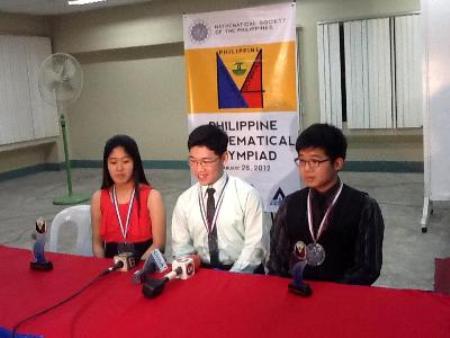Filtered by: Scitech
SciTech
Philippine Math Olympiad winners gun for int'l honors
By Barbara Marchadesch
How many lattice points are there inside a circle of radius 2√2 with center at the origin?
If you can figure out the answer (25) in a flash, then you might just be good enough to compete at the Philippine Mathematical Olympiad.
The PMO is the oldest, most prestigious, and arguably the most challenging math competition held among public and private high school students in the country. It is organized by the Mathematical Society of the Philippines with the Department of Science and Technology’s Science Education Institute.
Over the course of several months and a number of rounds, a pack of more than 3,500 of the best math students from high schools all over the country is gradually winnowed down to an elite 20, and then down to one champion.

The qualifying stage was held on October 22. Thousands of students from Luzon, Visayas, Mindanao and the National Capital Region went to the testing centers (there were at least one in each region) and sat down for a two-hour multiple choice exam consisting of 30 questions.
The participants who qualified made it to the Area Stage on November 26, where they sat for a three-hour written competition consisting of 20 questions. The regions that have qualifying participants had testing centers.
The final 20 then moved on to the final round on January 28. The National Stage, as it is called, is a written and oral competition—and a whole-day affair. The written portion counted for 70% of the total score and was held in the morning. The oral portion (30% of the total score) was held in the afternoon.
This year, the National Stage took place at the University of the Philippines’ National Institute for Science and Mathematics Education (NISMED) in Diliman, Quezon City.
The awarding ceremony for the finalists and winner of was held at the Bulwagang Tandang Sora of UP’s College of Social Works and Development on the evening of the same day. The proceedings began with dinner and a keynote address by DOST-SEI director Dr. Filma Brawner, before the top prize was awarded to 4th year high school student Henry Jefferson Morco from Chiang Kai Shek College in Tondo. Mikaela Angelina Uy of Saint Jude Catholic School was first runner-up, and Kenneth Co of Philippine Science High School was second runner-up.
PMO’s aims are to stimulate the improvement of Mathematics education in the country; to identify and motivate the mathematically gifted; and to consider from among these gifted students potential participants to the International Mathematical Olympiad, the largest and most prestigious international mathematics competition among secondary school students from all over the world.
The three top placers and the 17 other finalists of the PMO automatically qualify to become part of the training team for the IMO. After a rigorous training schedule that will last all summer, six of the top 20 will be chosen to be part of the national team. It won’t be a new thing for PMO champion Henry, as he was already a member of the 2011 national team.
The national team consists of one team leader, one deputy and six students. Last year’s performance in Amsterdam was the team’s best showing in recent years, with the country winning three bronze medals and ranking 54th out of more than 100 countries.
This year, the IMO will be held in Mar de Plata, Argentina, and team leader Julius Basilla hopes that they will do even better this time. The students will train hard for months, but nothing really prepares one for the toughness of the IMO. “We cannot give an exam that could match the [exam questions at] the IMO,” says Basilla. The selection process for team members picks out the best of the best; some of them have gone on to study at world-class schools such as the Massachusetts Institute of Technology (MIT). Basilla further explains that they look for well-rounded individuals, and also take into account how the students tackle the questions.
It is also part of the PMO’s mission to provide a vehicle for the professional growth of math teachers and encourage public and private sectors to take an interest in Mathematics education in the country.
Upon joining the national team, the students will be coached during the summer by mentors from UP and Ateneo instead of their high school coaches. But this doesn’t diminish the contributions their teachers made to their success. Henry has been a math whiz since his elementary school days, says his coach and teacher, Frederick Buiza. To prepare for the PMO, Buiza trained Henry and another Chiang Kai Shek qualifier, doing hourly sessions on geometry, algebra and trigonometry three days a week for months.
In the years he has been coaching students who have all placed highly at the PMO, this is the first time that one has actually won the top prize, and Buiza was justly proud of his protégé. “Siyempre mas masaya kasi nanalo siya,” he laughs. As the winning pair, Henry also received P15,000 while his coach got P5,000. — TJD, GMA News
More Videos
Most Popular




